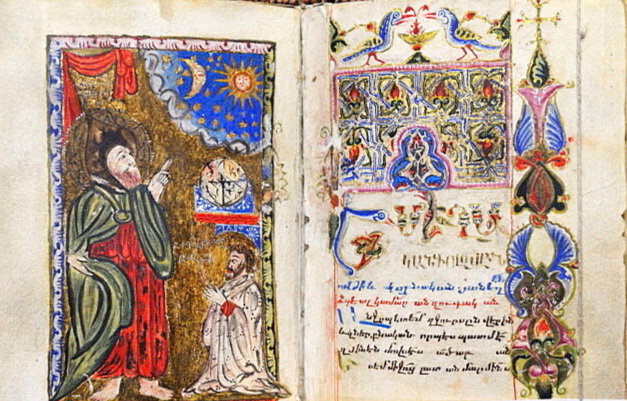Աստուած արդար և յիրաւի,
Եւ ողորմած յամենայնի.
Հանդէս ունիմ բան մի վիճի,
Թէ դու լսես քո ծառայի:
Just and truthful God,
compassionate to all,
I wish to protest,
if you will listen to your servant.
Այս է զարմանք հիանալի,
Որ կու լինի վերայ երկրի.
Եւ հիացումն ազգի ազգի,
զՈր տեսանեմք ի յաշխարհի:
There are too many paradoxes,
too much to ponder
on your earth,
too much to wonder at.
Գէմ մէկ Ադամ էր ի դրախտին,
Եւ մէկն Եւայ իւր նմանին.
Եւ մէկ բարբառ համազգային,
Մինչև կերեալ պտղոյ ծառին:
Արդ այս բանս է հիանալի,
Եւ առաւել զարմանալի.
Թէ մէկ Ադամ և յԵւայէ
Ո՞րքան ազգեր ծնան յերկրի:
From one Adam and one single Eve,
who spoke one common language,
when the fruit of Eden was eaten, came
so many nations unfriendly to each other.
So many tongues. How astonishing!
Տէ'ր, ոչ խնդրես վըրէժ յայտնի,
Եւ ոչ ցուցանես ակն ամենի.
Գիտես մարմինք եմ մըսեղի
Գեմ արձան չեմք զինչ պըղընձի:
Why do you forgive some, and forgive our grief?
Lord, you do not ask for the obvious vengeance.
And you do not stop the stride of evil
You know we are bodies made of flesh, not of iron.
Մէկն ի պապանց պարոնորդի,
Մէկն ի հարանց մուրող լինի.
Մէկին հազար ձի ու ջորի,
Մէկին ո'չ ուլ մի, ո'չ մաքի:
Here, a prince by birth,
there, a beggar from the start.
A thousand horses and mules for one to drive;
and the other without a single goat.
Մէկին հազար կապիճ ոսկի,
Մէկին ո'չ փող մի պըղընձի.
Մէկին հազար հատ մարգարտի,
Մէկին ո'չ հո'ւլնիկ ապիկի:
This man with boxes of coins,
that one without a copper cent.
One, with strings of pearls,
another, without a glass marble.
Զդաւվլաթն համէ` թէ ո՞ւր լինի,
Եւ զբաղդն ցոյց թէ ո՞ւր գըտւի,
Որ ի շուրջ գամ տասըն տարի,
Եթէ շալակ մ'ինձ հանդիպի:
Who doles out authority and power?
Where is luck found?
I will walk ten years for a drop.











